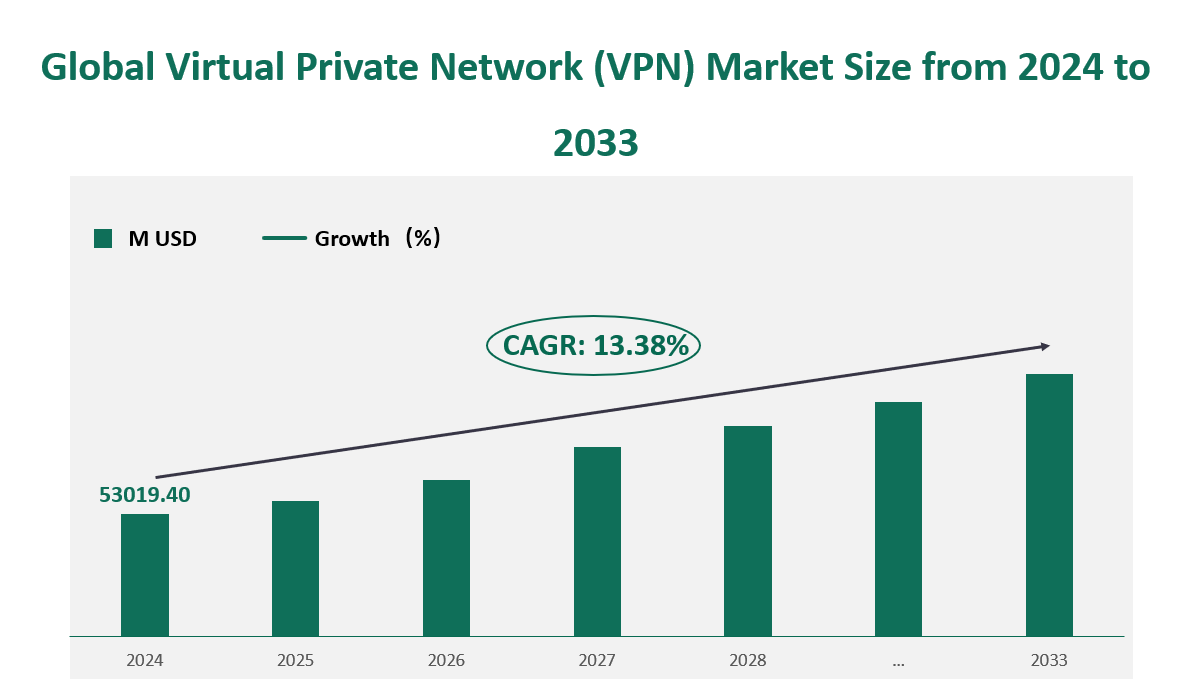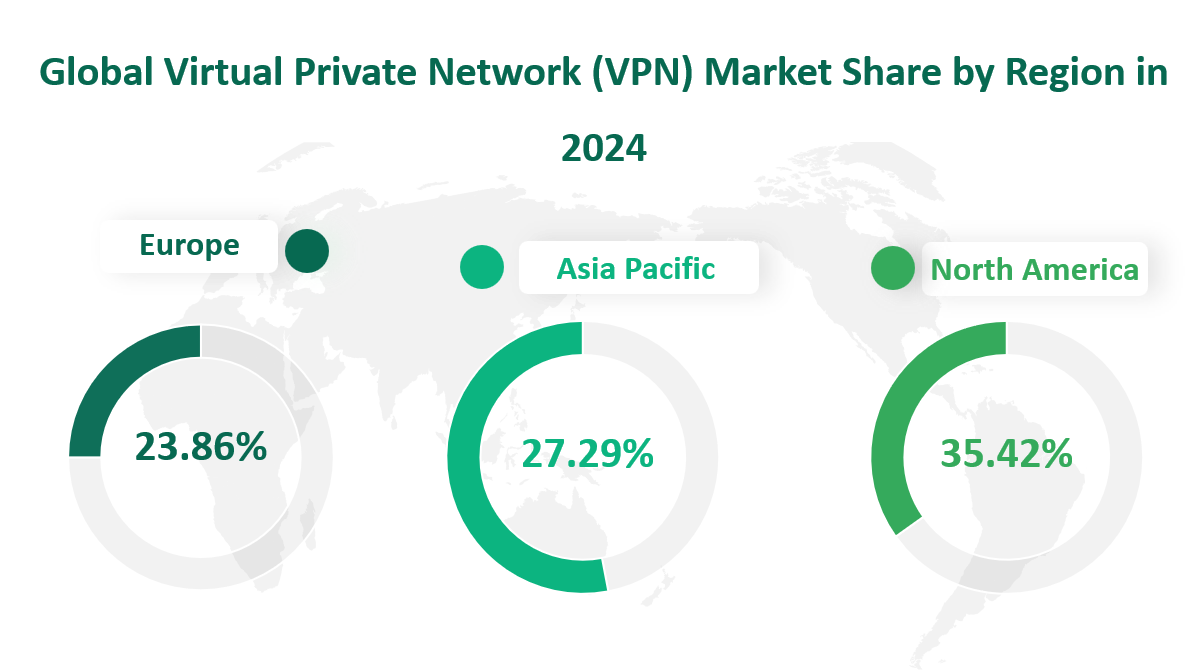1 Global Virtual Private Network (VPN) Market Size (Revenue) and CAGR (2024-2033)
Global Virtual Private Network (VPN) market generated revenue of USD 53019.40 Million in 2024 with a CAGR of 13.38% during 2024 to 2033.
The VPN market has experienced substantial growth in recent years, propelled by several key factors. Firstly, the COVID-19 pandemic accelerated the adoption of remote work, leading to a surge in demand for VPN services to ensure secure connections for employees working from home. This trend has continued even as restrictions eased, with many organizations maintaining flexible work policies that rely on VPN infrastructure.
Secondly, the growing awareness of cybersecurity threats and data breaches has prompted both individuals and enterprises to prioritize data privacy. VPNs offer a reliable solution by encrypting internet traffic and masking users’ IP addresses, thereby protecting sensitive information from potential cyberattacks. This has been particularly critical in industries such as finance, healthcare, and government, where data security is paramount.
Additionally, the expansion of the digital economy and the increasing prevalence of online activities have created a broader market for VPN services. Consumers are increasingly using VPNs to access geo-restricted content, while businesses are leveraging VPNs to connect multiple locations securely and efficiently. This dual demand from personal and corporate users has contributed to the steady growth of the VPN market.
Figure Global Virtual Private Network (VPN) Market Size (M USD) Outlook (2024-2033)

2 Virtual Private Network (VPN) Industry SWOT Analysis
Table SWOT Analysis
SWOT | Description |
Strength |
|
Weakness |
|
Opportunities |
|
Threat |
|
3 Global Virtual Private Network (VPN) Market by Type in 2024
The global Virtual Private Network (VPN) market is segmented into various product types, each catering to specific needs and applications. In 2024, the market was dominated by three primary types: Remote Access VPN, Site-to-Site VPN, and Other VPN solutions.
Remote Access VPN
Remote Access VPN is designed to provide secure connections for individual users accessing a private network from a remote location. This type of VPN is essential for remote workers who need to access corporate resources securely over the internet. In 2024, Remote Access VPN accounted for a significant portion of the market, with a revenue of $21,006.29 million USD. It held a market share of approximately 39.62% of the total VPN market. The growth rate of Remote Access VPN was steady, driven by the increasing adoption of remote work policies and the need for secure access to corporate networks.
Site-to-Site VPN
Site-to-Site VPN, also known as Router-to-Router VPN, connects multiple fixed locations over a public network, typically used by enterprises to link branch offices to the main office. This type of VPN ensures secure communication between different sites without exposing sensitive data to the public internet. In 2024, Site-to-Site VPN generated a revenue of $22,443.11 million USD, representing a market share of 42.33%. This made it the largest segment in the VPN market by revenue. The growth rate of Site-to-Site VPN was also significant, driven by the expansion of multinational corporations and the need for secure interconnectivity between different branches.
Table Global Virtual Private Network (VPN) Market Size and Share by Type in 2024
Type | Market Size (M USD) | Market Share (%) |
|---|---|---|
Remote Access VPN | 21,006.29 | 39.62 |
Site-to-Site VPN | 22,443.11 | 42.33 |
Others | 9,570.00 | 18.05 |
Total | 53,019.40 | 100.00 |
4 Global Virtual Private Network (VPN) Market by Application in 2024
The applications of VPNs are diverse, catering to both personal and corporate users. In 2024, the market was segmented into two primary applications: Personal VPN Users and Corporate VPN Users.
Personal VPN Users
Personal VPN Users refer to individuals who use VPN services for personal purposes, such as accessing geo-restricted content, protecting their online privacy, and ensuring secure browsing. This segment includes consumers who prioritize data privacy and security while using the internet. In 2024, Personal VPN Users generated a revenue of $11,293.13 million USD, accounting for 21.30% of the total VPN market. The growth rate of this segment was driven by increasing awareness of online privacy and the need for secure internet access.
Corporate VPN Users
Corporate VPN Users include enterprises and organizations that deploy VPN solutions to secure their networks, protect sensitive data, and enable remote access for employees. This segment is critical for businesses that require secure communication and data protection across multiple locations. In 2024, Corporate VPN Users accounted for the majority of the market, with a revenue of $41,726.27 million USD and a market share of 78.70%. The growth rate of this segment was robust, driven by the increasing adoption of remote work policies and the need for secure enterprise solutions.
Table Global Virtual Private Network (VPN) Market Size and Share by Application in 2024
Application | Market Size (M USD) | Market Share (%) |
|---|---|---|
Personal VPN Users | 11,293.13 | 21.30 |
Corporate VPN Users | 41,726.27 | 78.70 |
Total | 53,019.40 | 100.00 |
5 Global Virtual Private Network (VPN) Market by Region in 2024
In 2024, the global Virtual Private Network (VPN) market exhibited significant growth across various regions, driven by increasing demand for secure remote access, data privacy, and robust cybersecurity solutions. The market size and share varied across major regions, reflecting different levels of adoption and demand for VPN services.
North America
North America remained the largest regional market for VPN services in 2024, with a revenue of $18,779.47 million USD. This region accounted for approximately 35.42% of the global VPN market share. The dominance of North America can be attributed to the well-developed infrastructure, strong regional economies, and the presence of major market players. The United States, in particular, was a significant contributor to this revenue, driven by the widespread adoption of VPNs for both personal and corporate use. The growth in North America was also fueled by the increasing number of remote workers and the need for secure access to corporate networks.
Asia-Pacific
The Asia-Pacific region was the fastest-growing market for VPN services in 2024, with a revenue of $14,470.39 million USD and a market share of 27.29%. This region’s growth was driven by the rapid expansion of the digital economy, increasing internet penetration, and the growing awareness of cybersecurity threats. Countries such as China, Japan, and South Korea were key contributors to the region’s revenue, with significant adoption of VPNs for both personal and corporate use. The need for secure access to international content and the increasing number of remote workers further propelled the growth of the VPN market in this region.
Europe
Europe accounted for a substantial portion of the global VPN market in 2024, with a revenue of $12,650.43 million USD and a market share of 23.86%. The region’s market was driven by stringent data protection regulations, such as the General Data Protection Regulation (GDPR), which mandated the use of secure connections for handling personal data. The United Kingdom, Germany, and France were major contributors to the region’s revenue, with significant adoption of VPNs for corporate use. The growth in Europe was also influenced by the increasing number of remote workers and the need for secure access to corporate resources.
South America
South America’s VPN market revenue reached $3,250.09 million USD in 2024, accounting for 6.13% of the global market share. The region’s growth was driven by the increasing adoption of digital technologies and the need for secure internet access. Brazil was the largest contributor to the region’s revenue, with significant adoption of VPNs for both personal and corporate use. The growth in South America was also influenced by the increasing number of remote workers and the need for secure access to corporate networks.
Middle East and Africa
The Middle East and Africa region had a VPN market revenue of $3,869.02 million USD in 2024, accounting for 7.30% of the global market share. The region’s growth was driven by the increasing adoption of digital technologies and the need for secure internet access. Saudi Arabia and the United Arab Emirates were key contributors to the region’s revenue, with significant adoption of VPNs for corporate use. The growth in this region was also influenced by the increasing number of remote workers and the need for secure access to corporate networks.
Table Global Virtual Private Network (VPN) Market Size, Region Wise in 2024
Region | Market Size (M USD) | Market Share (%) |
|---|---|---|
North America | 18,779.47 | 35.42 |
Europe | 12,650.43 | 23.86 |
Asia-Pacific | 14,470.39 | 27.29 |
South America | 3,250.09 | 6.13 |
Middle East & Africa | 3,869.02 | 7.30 |
Total | 53,019.40 | 100.00 |
Figure Global Virtual Private Network (VPN) Market Share, Region Wise in 2024

6 Global Virtual Private Network (VPN) Market Top 3 Players
Company Introduction and Business Overview: Cisco Systems Inc, founded in 1984 and headquartered in San Jose, CA, is a global leader in networking and cybersecurity solutions. The company offers a wide range of technologies across networking, security, collaboration, applications, and the cloud. Cisco’s products include infrastructure platforms, applications, security solutions, and other related services.
Products Offered: Cisco’s VPN offerings include the Cisco AnyConnect Secure Mobility Client, which provides unified security services for remote access. This solution includes features such as endpoint compliance, highly secure network access, web security, network visibility, and off-network protection. Cisco AnyConnect is designed to provide comprehensive security for both personal and corporate users.
Revenue in 2021: Cisco Systems Inc’s VPN-related revenue reached $516.40 million USD. The company’s strong market position and extensive product portfolio contributed to its continued growth in the VPN market.
Company Introduction and Business Overview: Microsoft, founded in 1975 and headquartered in Redmond, WA, is a leading technology company that develops, licenses, and supports a range of software products, services, and devices. The company’s segments include Productivity and Business Processes, Intelligent Cloud, and More Personal Computing. Microsoft’s products include operating systems, productivity applications, server applications, and cloud-based solutions.
Products Offered: Microsoft’s VPN offerings include the Azure VPN Gateway, which enables secure, cross-premises connectivity between on-premises networks and Azure virtual networks. This solution supports Site-to-Site VPNs and Point-to-Site VPNs, providing secure access to Azure resources from anywhere. Microsoft’s VPN solutions are designed to meet the needs of both personal and corporate users.
Revenue in 2021: Microsoft’s VPN-related revenue reached $270.92 million USD. The company’s strong presence in the cloud and enterprise software markets contributed to its continued growth in the VPN market.
Company Introduction and Business Overview: NordVPN, founded in 2012 and headquartered in Panama, is a leading provider of VPN services. The company offers secure and private internet access through its VPN solutions, catering to both personal and corporate users. NordVPN’s products are designed to provide high levels of security and privacy while ensuring fast and reliable connections.
Products Offered: NordVPN offers a comprehensive VPN service with over 5,400 servers in more than 59 countries. The company’s VPN solution includes features such as strong encryption, a no-logs policy, and advanced security protocols. NordVPN also offers specialized features such as CyberSec, which protects users from malware and phishing scams.
Revenue in 2021: NordVPN’s revenue reached $239.46 million USD. The company’s strong focus on security and privacy, combined with its extensive server network, contributed to its continued growth in the VPN market.
Table Global Virtual Private Network (VPN) Revenue of Top3 Players in 2021
Company | Revenue (M USD) |
Cisco Systems Inc | 516.40 |
Microsoft | 270.92 |
NordVPN | 239.46 |

